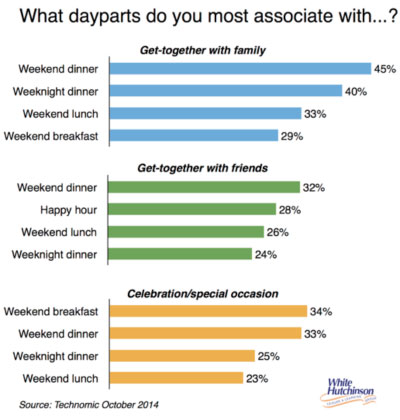
Vol. XIV, No. 10, December 2014
- Editor's travelogue
- Last chance to save $100 on FEC education for success, nothing less
- Trends for 2015
- White Paper - The Perfect Storm: LBE disruption & opportunity
- The great beer abandonment
- Arcade bars
- 35 million households visited an agritainment farm this summer and fall
- Understand who your competition is
- Chuck E. Cheese's goes educational
Understand who your competition is
Most people in the location-based and family entertainment industries consider their completion other entertainment venues. Or perhaps their thinking has shifted based on the research we have been reporting in this Leisure eNewsletter to also understand that their competition now includes digital entertainment competition (see our white paper in this issue for more on digital competition). However, that is still a shortsighted view. The truth is that in the majority of cases, the primary reason people gather with family or friends at an LBE or FEC or even a cultural venue is not for the entertainment or cultural offering, but rather to socialize, to have a communal experience. The entertainment, the cultural offering only becomes an excuse and facilitator of the socialization.
In a recent report, Nielsen noted an increasing consumer desire for gathering spaces within their communities, places that serve as a counter-balance to ever-increasing digital engagement. They pointed out that this desire for authentic physical gathering spaces extends from shopping centers to restaurants. Restaurants aren't just places to eat, they're places to meet friends, celebrate special occasions and often serve as local landmarks.
Yes, the competition for gathering places includes restaurants. This is even more true for women gathering together, as unlike most men, they don't require some form of participatory entertainment, recreation or leisure to center their socialization around.

The real challenge for LBEs' and FECs' future success is to be thought of as communal gathering places by people. This requires a lot more than just offering entertainment. And the really smart venues understand the importance of food and beverage to socialization, so they are become food and beverage destinations as well so that with their broader offering they will have a leg up on the restaurant competition. Entertainment venues need to stop even calling themselves entertainment venues, as that is a major psychological barrier for owners and management getting beyond the paradigm that descriptive term perpetuates and so consumers will understand their much broader appeal.
Vol. XIV, No. 10, December 2014
- Editor's travelogue
- Last chance to save $100 on FEC education for success, nothing less
- Trends for 2015
- White Paper - The Perfect Storm: LBE disruption & opportunity
- The great beer abandonment
- Arcade bars
- 35 million households visited an agritainment farm this summer and fall
- Understand who your competition is
- Chuck E. Cheese's goes educational


